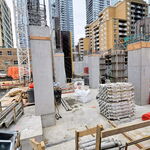The possibility to use one train crew for more than one trip, thus reducing relative labour costs and not at last: accommodation (i.e. Hotel) costs is one of the main reasons
why HFR will allow VIA Rail to be so much more profitable than it is currently on the Montreal-Ottawa-Toronto corridor. The prerequisite is a dedicated infrastructure and trains at least every 2 hours, in order to allow return trips for the LEs within their 12-hours limit...
I've looked up the
prices for season rail passes between Dover and London for the HSR commuter rail service (124 km in 1:06h) and the conventional commuter rail service (124 km in 1:51h) and they are as follows:
£5,184 ($10,682) for Dover Priory (DVP) to London Terminals [conventional commuter rail service]
£5,848 ($12,025) for Dover Priory (DVP) to London Travelcard Zones 1-6 [conventional commuter rail service]
£6,204 ($12,757) for Dover Priory (DVP) to London Terminals [any rail service]
£6,864 ($14,121) for Dover Priory (DVP) to London Travelcard Zones 1-6 [any rail service]
A commuter rail pass for Macclesfield (30 km south of Manchester) to London (1:40h for 267 km, thus equivalent to Quebec-Montreal) costs as follows:
£12,724 ($26,219) for Macclesfield (MAC) to London Terminals [any rail service]
£13,372 ($27,555) for Macclesfield (MAC) to London Travelcard Zones 1-6 [any rail service]
As you can see, the faster (i.e. HSR) commuter rail services between Dover and London are 20% more expensive to use than the conventional ones and passengers need to ask themselves if they value their free time for at least $5.76, which is the additional cost divided by the time saved: ($12,757-$10,682)/(0.75[h]*240[days]*2[directions]) = $2,075/360[h] = $5.76/h
Note that the
median weekly earnings of someone working in London is £659.90 (thus £34,315 annual income) and a daily commute from Macclesfield to London costs 37% (i.e. £12,724/£34,315) of an average worker's income, which should highlight how limited the demand potential for such a commute is (even given the huge differences in property prices between London and the rest of the UK, whereas I'd assume that those in Montreal and Quebec City are more or less equal).





